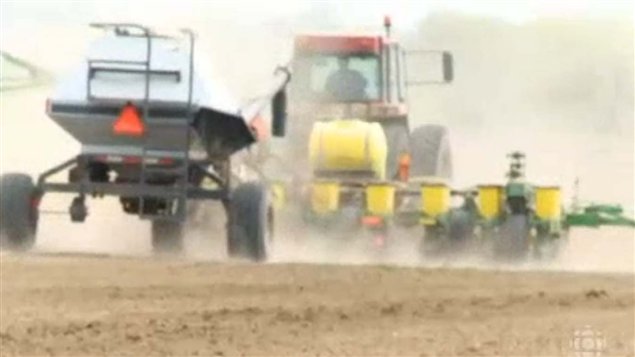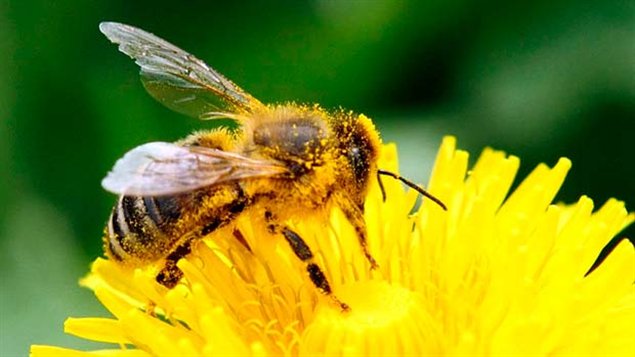Around the world beekeepers and scientists are becoming alarmed over the dramatic loss of bees.
Bees, both domestic-commercial, and wild bees, are critical for the pollination of plants and food crops.
While bee mites are also being blamed for bee deaths of domestic bees, and climate change could also be a factor, beekeepers are saying grain farmers use of a particular family of insecticides must be considered. These “neocotinoid” poisons are commonly used on a variety of food crops, especially with corn, which is very common in central Canada.

Scientific studies have linked even trace amounts as having negative affects on bee behavior and health. A moratorium has been imposed on the insecticide in Europe as a result.
Now however, a major grain organization in Canada is lobbying against similar action here.
The Grain Farmers Association of Ontario has launched a public relations campaign against any ban.
Barry Senft, CEO of the Grain Farmers Association. says there are a variety of reasons behind the drop in population including climate change and parasites, and alleges that there is no conclusive evidence that pesticide use is the culprit.
His association is sending out information kits to all its members as well as to MPPs (Members of the Provincial Parliament) urging them to help reject a ban on pesticides.
“We’ve sent out a postcard with a number of points we’d like our members to raise with MPPs and MPs, and we’re participating in a provincial committee that’s set up to look at the issue. Our message is that we need to let due process continue in terms of tests and results and not have a knee-jerk reaction in regards to the banning of a tool that’s very much utilized by our farmers.”
However, in April, in an effort to reduce health risks to honeybees, Ontario’s agriculture ministry asked grain farmers to take extra care when planting crops this spring.
A Ministry of Agriculture, Food and Rural Affairs entomologist said that “virtually all corn seed” is treated with a neonicotinoid insecticide, which could pose a threat to the health of honey bees. Tracey Baute said “neonicotinoid contaminated dust” is eventually carried into the air and could be linked to the death of thousands of bees.
Dan Davidson is in the unusual position of being a member of the Grain Farmers Association, but is also the president of the Ontario Beekeepers Association.
He says the postcard he received from the GFA, omits important information. He says when it lists the reasons for bees dying, there’s no mention of pesticides at all.
He says, “ I’m educated on neonicotinoids and I know what they’re capable of so I have no problem with them being banned. I’m sure if everyone knew and educated themselves on chemicals they’d feel the same way. A lot of farmers don’t know what they’re using, they’re just trusting what they hear from regulatory and from the chemical companies.”
(with files from CBC)
RCI-pesticides and bee colony collapse (with additional links)







For reasons beyond our control, and for an undetermined period of time, our comment section is now closed. However, our social networks remain open to your contributions.